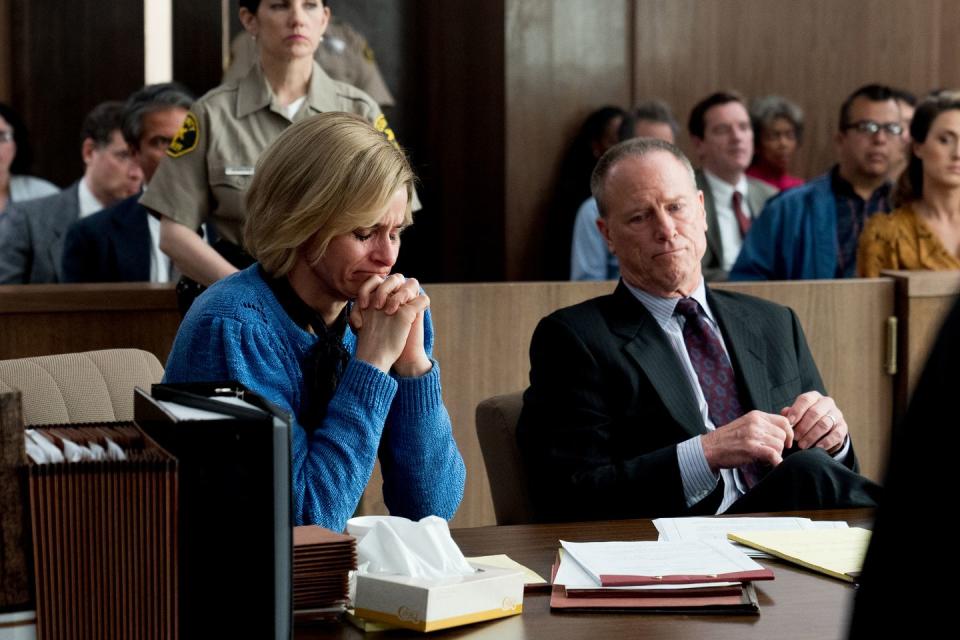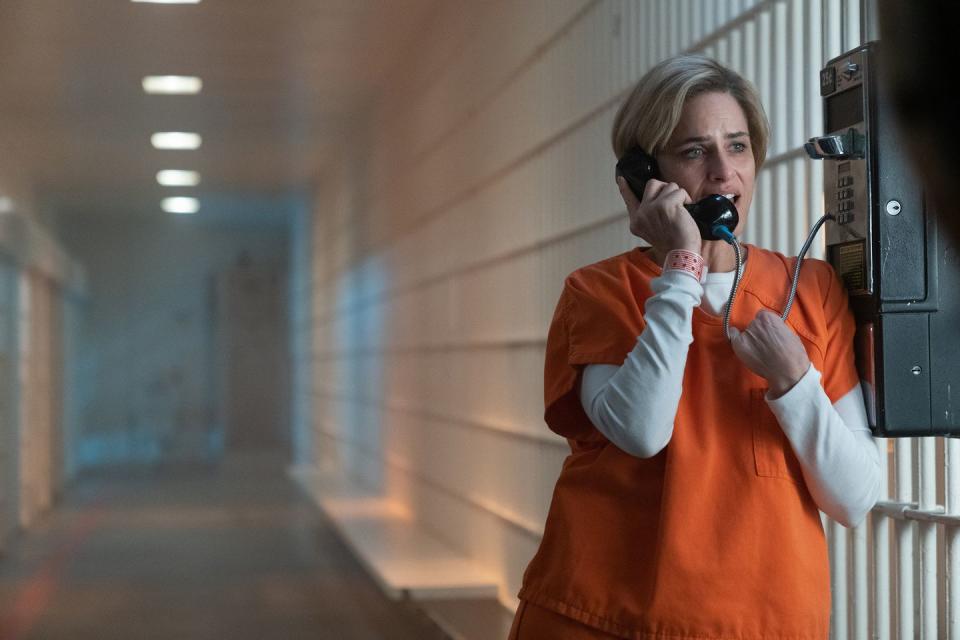'Dirty John' Star Amanda Peet on Betty Broderick and Reexamining Scorned Women

Mild Dirty John Season 2 spoilers ahead.
In today’s tabloid-obsessed era, audiences might have anticipated Dirty John: The Betty Broderick Story as yet another paper-thin portrayal of a “woman gone mad” saga allotted for easy-bake summer entertainment. But that’s not what they got. And that’s partly due to Amanda Peet’s complex and unsettlingly human portrayal of the real-life socialite and mother of four who in 1989 shot and killed her ex-husband, Dan Broderick (played by Christian Slater), and his new wife, Linda Kolkena (played by Rachel Keller).
Avoiding a usual ripped-from-the headlines style, the kind that detailed Betty’s case sans nuance back in the George H.W. Bush era, showrunner Alexandra Cunningham’s series examines the critical aspects of Betty’s identity that led to her final heinous act—including greed, heartbreak, and mental illness. Dirty John isn’t necessarily interested in removing Betty’s culpability, but rather exploring how an all-too-typical country club ID-having white woman diverged from an otherwise homogeneous lifestyle and made such a fatal decision. Not just out of sheer madness, but also because of an intense commitment to her family, privilege, and the cookie-cutter life she thought society owed her after the personal sacrifices she made to fit into the role of a perfect wife and mom.
Peet tells BAZAAR.com that this isn’t to validate Betty’s murders, but rather “to examine what leads someone to that kind of misery and desperation.” Whether that was Dan’s infidelity (about which he continuously lies to Betty, the gaslighting contributing to her becoming more and more unhinged when she learns her suspicions were correct), his merciless divorce settlement, the sexist scam of perfect wife means an ideal life, or Betty’s own narcissism, Peet’s performance highlights questions that should have been asked in lieu of tabloid talk back in the day.
Ahead, the actress talks to us about portraying the woman behind the damning headlines, the need to reexamine the way women are discussed, and the oft-dismissed economic value of homemakers.
What drew you to Betty Broderick and the Dirty John project?
Alexandra Cunningham, really. I think she's really brilliant. I guess when I think about true crime, I don't usually imagine that the story is going to entail an intimate portrait of the decline of a marriage. So, when I read The Betty Broderick Story, I was really surprised by the many intimate domestic marital themes.
I had never heard of Betty until I read the script. I sort of got Alexandra's perspective and then the tabloid fodder perspective afterwards. So it was really interesting to go in that order. And it was probably very beneficial, because it was obvious to me and clear to me that she was a very complicated person.
And the fact that Alexandra wasn't really interested in vilifying Dan Broderick. I think she really wanted to fight the idea that they were just complete tabloid fodder. I think she really wanted to try to humanize them and really examine what happened to this supposedly normal suburban mom.
I found that examination striking as well. The series deconstructs the scorned-woman image we've often seen portrayed in pop culture by actually exploring Betty's mental health and how she was gaslighted. How did that inform your process and understanding of her?
I think Alexandra wanted to upend that trope and was concerned that [Betty] was mostly known as a woman scorned. It's sort of an intrinsic part of that term that said woman's emotions are somehow unjustified. Alexandra doesn't excuse the fact that Betty Broderick murdered two people. It's not to excuse or justify that but just to really examine what leads someone to that kind of misery and desperation.

Was there any other type of research or preparation you did to delve deeper into the character?
I really relied on Alexandra, because I thought that her scripts were so intelligent, and her take had a lot of depth. When you look at the bits of video footage we have of Betty Broderick, it's very choppy and it's all murder. So much of what Alexander's story is focusing on is everything that led up to the murder. In a weird way, I found that the footage wasn't that helpful, because it was all post her psychotic break. I wanted to honor Alexandra's script and the fact that it was focusing on the earlier years and the years leading up to the murders.
I was scared to focus too much on footage that only touches on the end of the story when the point of Alexander's piece How did this happen? What is the before picture?
Yeah, and it goes all the way back to her teenage years right before college.
Yeah, she's getting her period. I think that was very important. I think Alexandra felt the fact that Betty grew up in the social mores of the '50s in a fairly strict Catholic family really affected how isolated and myopic her world became. Betty was incredibly smart and could have pursued a professional career. But I think mostly women from that era in her socioeconomic place were taught that the most important thing is to become someone's wife and a homemaker. For some of those women, that meant consuming your identity into your husband's identity.
Betty is a victim of domestic emotional abuse. And she's also a suburban white mother and wife whose privilege made her feel entitled to a certain financial wealth, and much of her rage came from the fact that she no longer had it after her divorce. How do you think that complicates her narrative as a victim?
I don't think she's blameless by any stretch of the imagination. And I think it was important for Alexandra to include the ways in which Betty was abusive and the ways in which she was destructive, including the idea that she was very attached to that ladies-who-lunch mentality. I think it's a question to what degree was she and a lot of women who grew up in the '50s [were] forced into that and how much were they really complicit in pursuing that.
It certainly left her no skill set when it came to the divorce and in terms of entering the workforce. I think a lot of women probably sublimated their potential intellectual pursuits into shopping and social climbing. She wasn't immune to that at all, and obviously it's a very unattractive quality in a person. I'm sure we're all guilty of that on some level. But I think it really hurt her that she was so isolated and too proud to admit that she was in trouble and didn't get the kind of help that she needed.
Mental illness is still stigmatized now, but I think in her day, it was even worse. We know so much more about mental illness now and as bad as it was then.
I agree. I think even the way we discuss abuse, even still to this day, is often through a physical lens that marginalizes this less obvious form of abuse and manipulation. We're beginning to contend with that now, but back in the day, there wasn't a whole lot of language around it.
I think that's absolutely right. The way I see it, Betty was emotionally really trapped and too isolated, [and] her point of reference for the world was so tiny that she couldn't see a way out eventually. Part of that was because she was sadistic, but there's a reason why she couldn't recognize that.
Dan's gaslighting is certainly evident. But Betty often says her world was so overwhelming because she couldn't wrap her mind around the fact that society led her to believe that if she was the perfect homemaker, she'd have the perfect life, and it didn't end up like that for her. So maybe that was the ultimate gaslighting.
Yeah. And obviously for women, there's been a huge cultural shift since then. But my mom struggled with it. My mom got divorced in '89 as well and had kind of a start-and-stop career when my sister and I were little. It's a rude awakening. I think Alexandra also wanted to hit on that. Like, so you devote 20 years, two decades, to being a homemaker and raising children. Can you count that in a court of law as a contribution to your husband's financial worth? What extent is your husband's income power contingent on a woman's role at home? That's something we didn't think about as much in the '80s. Now people understand that when a woman is at home, raising children and keeping a home, that's a hard-core contribution that deserves to be recognized in a court of law.

The end of the season contends with that. What do you think about the fact that other women like Betty came to her defense and wrote her letters of support while she was in prison?
I mean, I can't ever [see it their way]. Like, she still murdered her children's father before they were even close to being adults. So there's nothing about that that I can justify, you know? Yes, I think probably because of everything we've just discussed, a lot of women felt like they really saw that she was gaslit and to be left after 20 years or more …
I think that is the crux of Betty’s story here. It strikes so many conflicts with the audience that far exceed the question of condoning her behavior.
Yeah, I think that that's what Alexandra was really interested in. I'm telling you, it's just Alexandra. When I first read it, I felt my allegiances sort of swaying, even when she ran the car into his home. She doesn't know whether her children are standing right there or what. It was very important to me, and I think also to Christian, that Alexander wasn't trying to portray either of them as sinners or saints, and was really trying to dig into a very nuanced story that included a lot of historical and cultural misogyny.
I mean, we're getting a much fuller picture of Monica Lewinsky now. We're revisiting a lot of these branded women. I'm not comparing Monica Lewinsky to Betty Broderick. Betty Broderick's a murderer; it's different. But I think that right now, there's room culturally for us to reexamine some of these stories and the overly simplistic way we saw something or the overly simplistic way that media portrayed a story.
This interview was edited and condensed for clarity.
You Might Also Like
